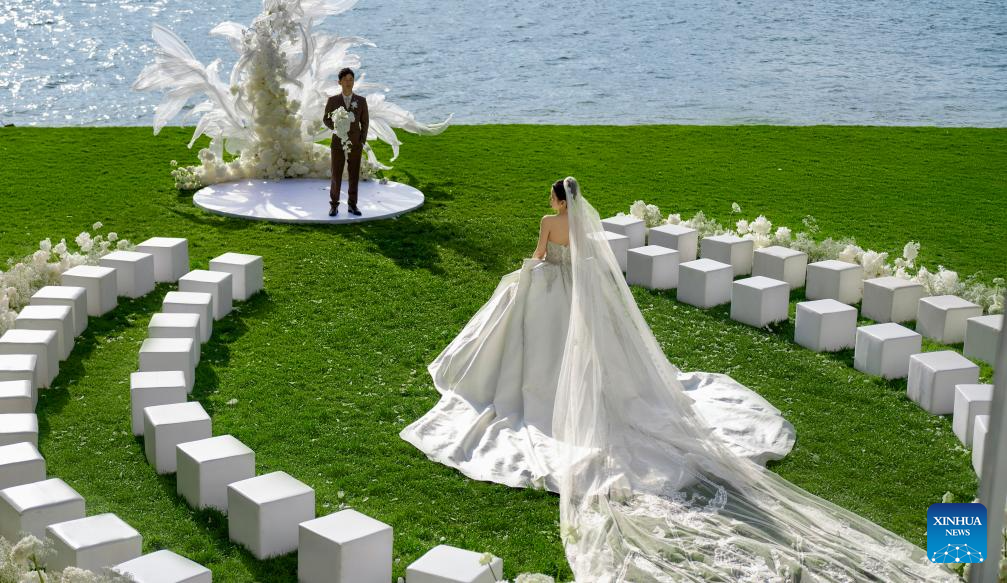




- BRNN
- BRI News
- BRNN News
- Database
Official Documents Polices and Regulations
Inter-government Documents International Cooperation BRI Countries
Business Guide Economic Data BRI Data
Trade
Investment Projects Latest projects
Cases - Content Pool
An increasing number of young Chinese couples are turning away from traditional, elaborate, and costly weddings. Instead, they're embracing simpler and more creative celebrations that reflect their personalities and values. This shift is giving the wedding industry a fresh new look.
In May, a "post-95s" couple in Taiyuan, north China's Shanxi Province went viral for hosting their wedding banquet at a Haidilao hotpot restaurant instead of a hotel.
Nowadays, more and more young people are challenging traditional wedding norms by ditching rigid procedures and lavish spending in favor of simple and more meaningful alternatives. Experts say this trend reflects not only changing consumption habits but also deeper shifts in attitudes toward love, marriage, and personal values.

A couple holds a destination wedding in Dali Bai Autonomous Prefecture, southwest China's Yunnan Province, May 10, 2025. (Photo/Xinhua)
The couple in Shanxi invited 140 guests, spending 22,500 yuan (around $ 3,133). When the bride Zhao Yiming posted a video of the celebration online, it quickly racked up over 30 million views.
Originally, the couple had planned a traditional hotel banquet, but the venue shut down unexpectedly. "So we decided to try something different," she said. And with that, a one-of-a-kind hotpot wedding was born.
Their creative choice reflects a broader trend of redefining wedding traditions. According to a report by expo.jiehun.com, a leading platform for booking wedding services, today's young couples are opting for smaller and more refined celebrations that emphasize quality over scale.
The shift extends beyond banquets. New practices are emerging in every aspect of weddings, from ceremony formats to venue choices.
Destination weddings have grown in popularity. One month ago, Huang Qin and Zhen Congcong from Suzhou, east China's Jiangsu Province, held a private ceremony in Dali, southwest China's Yunnan Province. With only their parents present, they exchanged vows against the scenic backdrop of Cangshan Mountain and Erhai Lake.
"There were no crowds, no lengthy formalities, just our parents and the beauty of nature," said Huang.
Zhang Wenzhi, a wedding planner in Beijing, has witnessed the shift firsthand.
"In the past, it was all about flashy convoys and pranks. But that often led to unnecessary extravagance," Zhang said. Now, some couples are swapping luxury cars for buses, e-bikes, or even shared bikes. Others serve milk tea instead of expensive alcohol, Zhang said.
From a sociological and consumer psychology perspective, young people today prioritize self-expression and personal experience over fanfare and show, said Chi Yunjia, associate professor at Huazhong Agricultural University's College of Economics and Management.
According to the 2023-2024 wedding market trends report by expo.jiehun.com, young couples are becoming more budget-conscious, with average wedding costs dropping by 10 to 15 percent.
"The evolving formats are enriching the entire wedding industry chain," said Heng Yun, secretary-general of the wedding industry association in south China's Guangdong Province. One-stop wedding services are now in high demand, offering young couples both convenience and customization, Heng said.
Destination weddings have even matured into full-fledged business models in popular tourist destinations in Yunnan Province, northwest China's Xinjiang Uygur Autonomous Region, and south China's Hainan Province. Meanwhile, tea brands like HEYTEA and CHAGEE are riding the wave of replacing alcohol with tea at weddings. In 2024, HEYTEA sold over 200,000 cups of its custom wedding tea through group catering services.

Tel:86-10-65363107, 86-10-65368220, 86-10-65363106